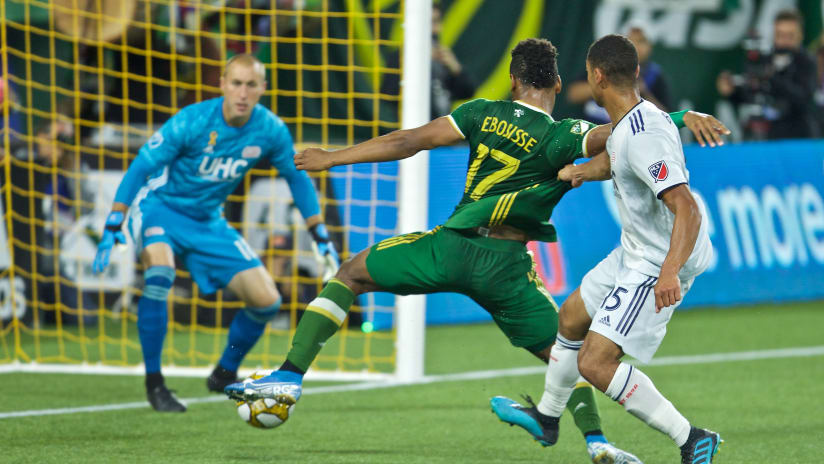PORTLAND, Ore. -- Should holding a player’s jersey while he throws himself to ground be considered a foul? If your answer is yes, that having a handful of jersey is an obligatory call, then you probably agree with what Wednesday’s officials saw as a late infraction on Portland Timbers’ defender Larrys Mabiala – a call that led to New England Revolution midfielder Carles Gil’s late, penalty-kick equalizer. But you also likely wanted the Timbers to get a whistle earlier in the half, when Jeremy Ebobisse was being pulled from behind at the edge of the Revs’ six-yard box by fullback Brandon Bye, yet the officials let the play go.
What if Ebobisse fell like Wilfried Zahibo, though? His progress wouldn’t have been impeded, as he wouldn’t have been trying to make progress, at all. Can somebody be obstructed if there’s no progress to obstruct?
The biggest difference between Wednesday’s two controversial plays: Ebobisse was in a position to be infringed; the Revs’ substitute went to ground. Credit the midfielder for doing everything he could to give his team a chance to equalize, but should games at this level, with so much on the line, be settled by dives versus non-dives? By one player benefiting from simulating while another plays through? By the third team on the field providing different interpretations of similar plays, judged by the same rule?
This is soccer. These types of inconsistencies have happened before, and they’ll happen again. Teams know the landscape. They have to account for it. But in an era of video review, where an official is isolated in a secure room to review every angle available, how does one instance go uncalled while the other sways a result?
There is no universe where both of these interpretations were correct. Except this one. Nor should there be a universe where both are wrong. Except this is one. As a result, the night’s festivities ended up drawn, 2-2, with Ebobisse’s second-half brace overshadowed by controversy come the final whistle.
That controversy is What We’ll Remember most from Wednesday’s game, even if, until the last turn, the home team’s attacking breakthrough was the star of the show.
Scoreless streak over
It’s not only that the Timbers had gone three full games (all at home) without a goal. They hadn’t even led in regulation time since the end of the Real Salt Lake match on September 7. With one diving finish from Ebobisse, though, that all changed:
Ebobisse had a similar chance against Minnesota – a ball driven in from the left, then by Sebastián Blanco, that pressed his athleticism for a diving finish – but the bounce and the lunge didn’t line up. The ball went wide of goal. Tonight, Ebobisse met Jorge Villafaña’s cross flush, and with Bill Tuiloma occupying defenders in front of him, the third-year forward had the space he needed to power home his season’s 10th goal.
Just over half-an-hour later, another memorable Ebobisse finish made it 2-0, though his 11th goal of the season used a slightly different technique:
Ebobisse could have had more, too. Bye’s non-foul cost him another second-half chance, above, while his finish past Brad Knighton just after his first goal was waved off for offside. Repeatedly, especially in the second half, Ebobisse put himself in position to be dangerous. His second goal may have required luck, but he made sure he was in the right place for the bounce.
Coming into the season, Ebobisse had three goals in 766 career MLS minutes. Now, he’s tied for the team lead this season, running his career mark to 14 with his career’s first multi-goal performance.
Three points slip away
We covered the inconsistency in the final call above, but there’s an unfortunate reality that allows that goal to matter: With eight minutes left in regulation, Portland was up two goals and controlling the match. Between their scores, Portland controlled 57.3 percent of the match’s possession. Even over regulation’s last six minutes, when the Timbers were up two, they held 53.1 percent of the ball.
In added time, though, that changed. New England had already halved Portland’s lead in the 87th minute through a one-time finish from Gustavo Bou. Once the clock struck 90, the Revs chased their equalizer with 68.6 percent possession while outshooting the Timbers five to one.
That’s not uncommon in late-match scenarios, when one team’s incentives are entirely in defense, while the other has to bomb forward. The scenario, though, set Portland up for disappointment. It allowed Zahibo’s ingenuity to decide the final moments.
Inching above the playoff line
Ultimately, the drama from Wednesday’s game may not matter. Thanks in part to the Philadelphia Union’s victory in San Jose, the Timbers are in sixth place, continue to control their own destiny, and could clinch a playoff spot as early as Sunday in Kansas City. A victory over Sporting coupled with a loss by either the Earthquakes or FC Dallas will send Portland to the postseason for a third consecutive season.
If that happens, the positives from Wednesday will matter most. The team’s attack finally broke through. They defended well for the vast majority of the match, and for most of the second half, they looked poised to kill the game off while playing on the front foot. Some of those positives faltered by full time, but compared to where the team’s been over their last four games, there was progress in those results.
If the team stumbles over their last games, though, tonight’s final moments will haunt them. Then again, when the playoffs become such a close call, every setback has the potential to define your season.












